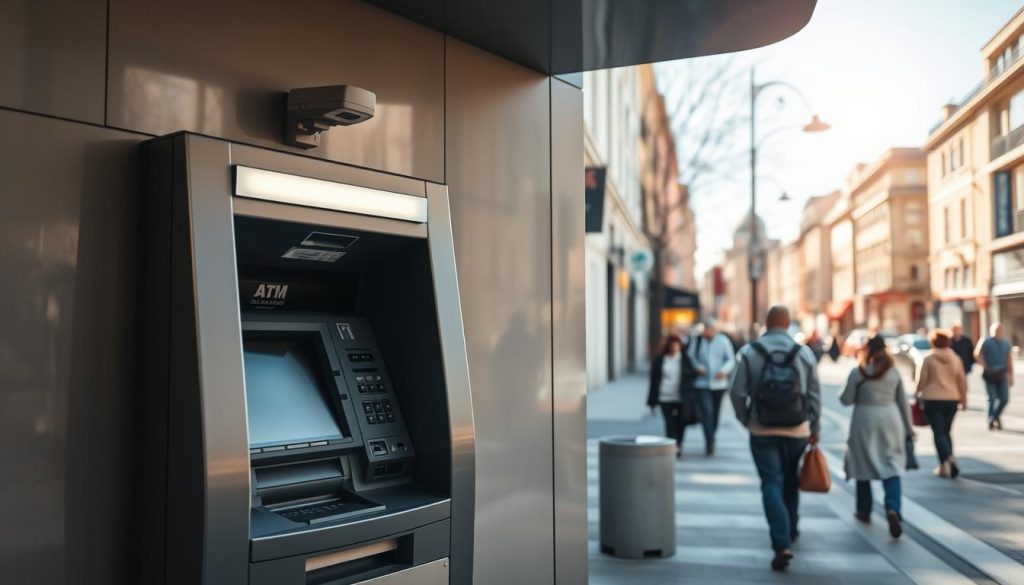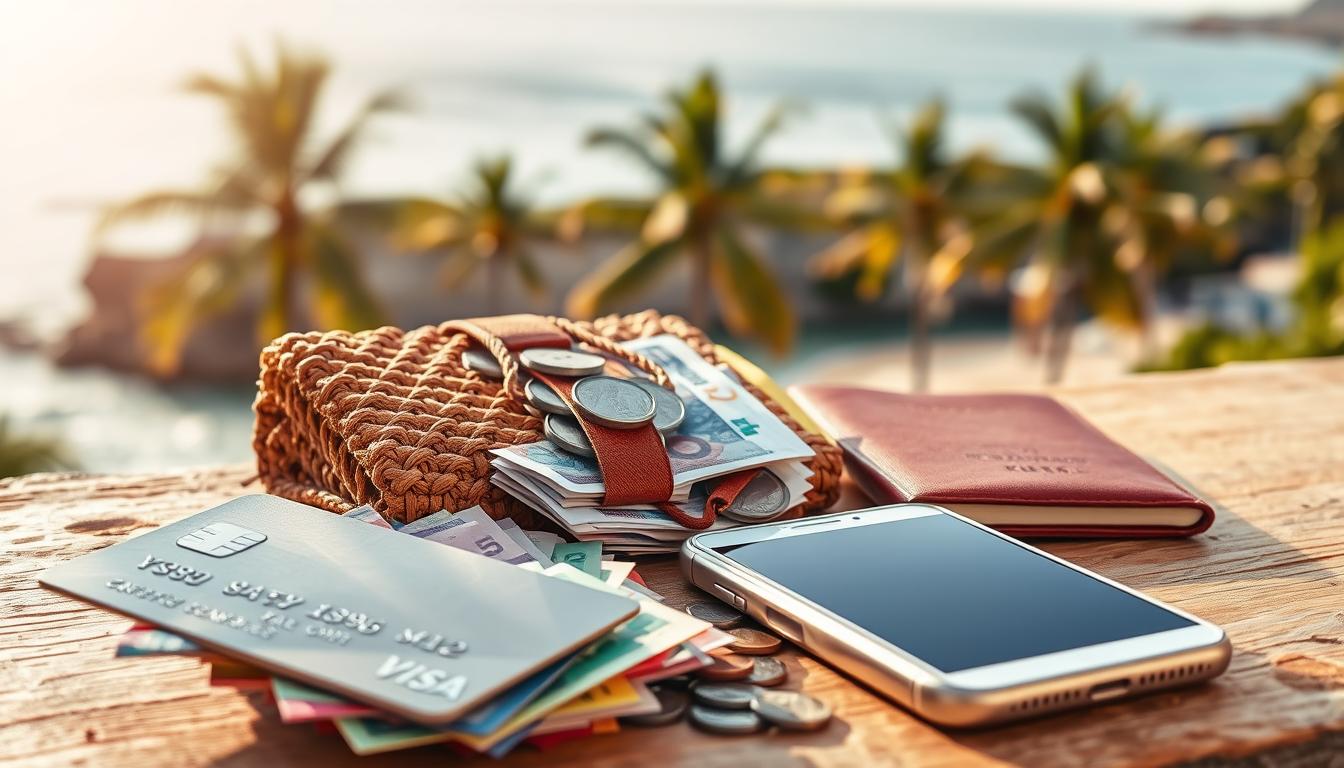Did you know that over 50% of visitors to this tropical destination are returning diaspora members? This unique travel hotspot offers stunning landscapes and rich culture, but navigating its financial landscape can be tricky without proper preparation.
Understanding local payment methods and currency is essential for a smooth journey. Whether you’re planning to use your card or withdraw cash, knowing the basics can save you time and stress. This guide will help you feel confident from the moment you land at the airport.
From ATM locations to credit card fees, we’ll cover everything you need to know. Advanced planning ensures you can focus on enjoying your travel experience without financial worries. Let’s dive into the essentials for managing your money effectively.
Introduction: Financial Savvy for Your American Samoa Adventure
Navigating a new country’s financial system requires preparation and insight. Whether you’re exchanging currency or using local payment methods, understanding the basics ensures a smooth experience. This section will help you manage your finances effectively from the moment you arrive.
Overview of Money Matters
When traveling, knowing how to handle money is crucial. Currency exchange rates, payment methods, and local banking services can vary widely. Researching these details ahead of time saves you from unexpected fees and delays.
For example, using ATMs in urban areas often incurs lower fees compared to rural locations. Carrying a mix of cash and cards ensures you’re prepared for any situation. Local service providers may also offer better rates than airports or hotels.
Why Pre-Planning is Essential
Pre-planning your finances minimizes risks and maximizes convenience. Hidden fees, unfavorable exchange rates, and limited access to services can disrupt your trip. Setting up your finances before you travel allows you to focus on enjoying your journey.
Here’s a quick comparison of key financial considerations:
| Consideration | Pre-Planning Benefit |
|---|---|
| Currency Exchange | Better rates at banks or authorized offices |
| ATM Withdrawals | Lower fees with fewer transactions |
| Payment Methods | Mix of cash and cards for flexibility |
| Local Services | Understanding hours and availability |
By taking the time to plan, you’ll avoid unnecessary stress and enjoy your adventure to the fullest. Local banks and service providers can offer valuable insights, so don’t hesitate to ask for advice.
American Samoa: Ultimate Travelers Guide to Currencies & Payments
Planning your finances for a trip ensures you can focus on enjoying every moment. From meals at local restaurants to getting around by bus, daily expenses can add up quickly. Knowing how to manage these costs helps you stay within budget and avoid surprises.
One of the first things to consider is where you’ll eat. Local restaurants often offer delicious and affordable options. However, prices can vary, so it’s wise to research ahead of time. This way, you can plan your meals and save money for other activities.
Transportation is another key expense. Using the bus is a cost-effective way to explore the area. It’s also a great way to experience local culture. Make sure to check schedules and routes to avoid delays during your day.
Here’s a quick comparison of daily expenses to help you plan:
| Expense | Approximate Cost |
|---|---|
| Meal at a local restaurant | $10-$20 |
| Bus fare | $1-$3 per ride |
| Activities per day | $15-$50 |
By organizing your finances, you can make the most of your trip. Whether it’s enjoying a meal or exploring by bus, a little planning goes a long way. This approach ensures you’re prepared for every day of your adventure.
Pre-Trip Financial Planning and Preparation
Preparing your finances before a trip can make all the difference in your travel experience. By organizing your money and understanding the best way to handle it, you’ll avoid unnecessary stress and focus on enjoying your journey. This section covers essential tips to help you plan effectively.

Smart Currency Exchange Strategies
Exchanging currency at the right time and place can save you money. Avoid airport counters, as they often offer less competitive rates. Instead, compare rates at local banks, credit unions, or online platforms. Timing your exchanges during favorable market conditions is another smart way to maximize your funds.
Here are a few tips to get the best rates:
- Exchange larger sums to reduce transaction fees.
- Monitor exchange rates a few weeks before your trip.
- Use trusted platforms or banks for secure transactions.
Setting Up International Banking Alerts
Keeping track of your spending abroad is crucial. Setting up banking alerts ensures you’re notified of every transaction. This way, you can spot any unauthorized activity immediately. Most banks allow you to customize alerts for specific amounts or types of transactions.
Here’s how to set it up:
- Log in to your online banking account.
- Navigate to the alerts or notifications section.
- Choose the types of alerts you want to receive.
By taking these steps, you’ll have peace of mind knowing your finances are secure. Plus, you’ll avoid surprises when you check your account after a long hour of exploring.
Advanced planning is the best way to ensure a smooth financial experience. Whether it’s exchanging currency or setting up alerts, these tips will help you stay in control. With these strategies, you’ll be ready to enjoy every hour of your adventure without worrying about money.
Understanding Currency Exchange Options
Currency exchange decisions can impact your travel budget more than you think. Whether you exchange money before your trip or after arriving, each option has its pros and cons. Knowing the best place and time to exchange currency ensures you get the most value for your money.
Exchanging Currency at Home vs. Abroad
Exchanging currency at home offers convenience and security. Banks and authorized exchange bureaus often provide competitive rates. However, rates may vary depending on your area. It’s a good idea to compare options before committing.
On the other hand, exchanging money abroad can sometimes yield better rates. Local exchange bureaus in popular tourist places often cater to travelers. However, airports and hotels tend to charge higher fees. Researching local options can help you avoid unnecessary costs.
Here’s a quick comparison to help you decide:
- At Home: Secure, convenient, but rates may vary.
- Abroad: Potentially better rates, but watch for hidden fees.
Local banks and exchange bureaus in your destination area often provide the best rates. They also offer a higher level of security compared to informal options. Always choose trusted providers to ensure a smooth transaction.
By weighing the benefits and drawbacks, you can make an informed decision. Whether you exchange money at home or abroad, planning ahead ensures you’re prepared for any financial situation during your trip.
Credit and Debit Cards: Your Essential Travel Companions
Using credit and debit cards wisely can transform your travel experience. These tools offer convenience and security, but understanding how to use them effectively is key. This section provides practical tips to help you manage your cards and avoid unnecessary fees.
Minimizing Foreign Transaction Fees
Foreign transaction fees can add up quickly if you’re not careful. Many banks charge a percentage of each purchase made abroad. To avoid these costs, consider using cards specifically designed for travel. These often have lower or no foreign transaction fees.
Here are some strategies to minimize fees:
- Notify your bank about your travel plans to avoid card blocks.
- Choose cards with no foreign transaction fees for international use.
- Monitor your charges regularly to spot any unexpected fees.
Understanding your card’s policies is crucial. Some cards offer additional benefits like travel insurance or rewards. Researching these features can help you make the most of your spending. Always keep an eye on exchange rates to ensure you’re getting the best value.
Choosing the Right Card for Travel
Not all cards are created equal when it comes to travel. Some offer better rewards, while others focus on low fees. Consider your spending habits and choose a card that aligns with your needs. For example, if you plan to shop frequently, a card with cashback rewards might be ideal.
Here’s a comparison of popular card options:
| Card Type | Benefits | Best For |
|---|---|---|
| Travel Rewards | Points for flights and hotels | Frequent travelers |
| No Foreign Fees | Zero transaction fees abroad | International shoppers |
| Cashback | Earn money on purchases | Everyday spending |
By selecting the right card, you can save money and enjoy additional perks. Whether you’re exploring local markets or dining at a shop, having the right financial tools ensures a smooth experience. Always seek the best information to make informed decisions.
With these tips, you’ll be ready to use your cards confidently. From minimizing fees to maximizing rewards, a little planning goes a long way. Enjoy your journey without worrying about unnecessary financial hassles.
Accessing ATMs and Cash Withdrawal in American Samoa
Accessing cash during your trip doesn’t have to be stressful with the right preparation. Knowing where to find ATMs and how to use them safely ensures you’re always prepared for daily expenses. Let’s explore the essentials for managing your cash effectively.
ATMs are primarily located in urban areas, with fewer options in rural regions. While Visa and MasterCard are widely accepted, it’s wise to carry some cash for smaller businesses or markets. Always check the operating hours of ATMs to avoid inconvenience.
Using unfamiliar machines can pose a risk, so take precautions. Shield your PIN, avoid poorly lit areas, and inspect the machine for skimming devices. These simple steps can protect you from fraud and unauthorized transactions.
Here are some practical tips for secure cash access:
- Withdraw smaller amounts to minimize fees and reduce exposure to risk.
- Keep a record of ATM locations and their operating hours.
- Notify your bank about your travel plans to avoid card blocks.
Understanding local culture can also influence your financial interactions. Many small businesses prefer cash, so having local currency on hand is often necessary. Respecting these practices ensures smooth transactions and positive experiences.
By following these guidelines, you’ll navigate cash withdrawals with confidence. Whether you’re exploring urban centers or rural areas, being prepared ensures you can focus on enjoying your journey without financial worries.
Navigating Payment Methods at Airports and Hotels
Managing payments at airports and hotels can be tricky without the right knowledge. From digital wallets to cash transactions, understanding your options ensures a smooth experience. This guide helps you navigate these travel hubs with confidence.
Airports often have multiple payment methods, including contactless and digital wallets. These are convenient for quick purchases at stores or cafes. However, fees can vary, so it’s wise to compare options before committing.
Hotels, especially during late-night check-ins, may have limited payment systems. Always confirm accepted methods beforehand to avoid surprises. Some stores and hotels charge extra for credit card transactions, so it’s helpful to carry some cash.
Here are some tips to manage payments effectively:
- Use contactless methods for faster transactions at busy terminals.
- Check for hidden fees when paying at stores or hotels.
- Keep a mix of cash and cards for flexibility, especially at night.
Security is another key factor. Always shield your PIN and avoid using public Wi-Fi for transactions. These steps protect you from fraud and ensure peace of mind during your travels.
By understanding these nuances, you’ll handle payments with ease. Whether it’s a quick purchase at a store or a late-night hotel check-in, being prepared makes all the difference.
Shopping and Payment Etiquette in American Samoa
Understanding shopping etiquette and payment norms can enhance your experience in this unique location. Whether you’re exploring local markets or making purchases near an international airport, knowing what to expect ensures smooth transactions.
Sales Tax Considerations and Hidden Fees
In the united states, sales tax varies by location, and prices often don’t include it. This means your total cost at checkout may be higher than expected. Always check for additional taxes, especially near an international airport, where fees can add up quickly.
Hidden fees are another factor to watch for. Some businesses may charge extra for card payments or services. Here’s how to spot and avoid them:
- Ask about additional charges before making a purchase.
- Compare prices at different stores to identify discrepancies.
- Negotiate politely if you feel a fee is unreasonable.
Regional differences in the united states also play a role. For example, bus fares and meal costs can vary significantly. Researching local norms helps you stay within budget and avoid surprises.
By staying informed and prepared, you can shop confidently and enjoy your time in this vibrant location. Whether you’re near an international airport or exploring rural areas, these tips ensure a seamless experience.
Mastering Tipping Culture: US vs. American Samoa
Understanding tipping customs can make your travels smoother and more respectful. Tipping practices vary widely between the continental US and the island, and knowing the differences ensures your gestures are appreciated.

In the US, tipping is often expected in restaurants, hotels, and for services. However, on the island, customs are more relaxed. Smaller communities, especially in village settings, may not always expect tips. It’s important to observe local norms to avoid misunderstandings.
When and How Much to Tip
In restaurants, tipping 10-15% is common in the US. On the island, tipping is appreciated but not always mandatory. If service is exceptional, a small gratuity is a kind gesture. For hotel staff, tipping $2-$10 is customary in the US, while on the island, smaller amounts are often sufficient.
Tour guides and taxi drivers also have different expectations. In the US, tipping 10-20% is standard. On the island, rounding up the fare or offering a small tip is usually enough. Always consider the context and level of service.
Here’s a quick comparison of tipping norms:
| Service | US Tipping Norms | Island Tipping Norms |
|---|---|---|
| Restaurants | 10-15% of the bill | Optional, small amount |
| Hotel Staff | $2-$10 per service | Smaller amounts |
| Taxi Drivers | 10-20% of the fare | Round up the fare |
| Tour Guides | $20-$30 per person | Small tip or gift |
Local village customs can also influence tipping etiquette. In smaller communities, offering a small gift or token of appreciation may be more meaningful than cash. Observing and respecting these traditions ensures your gestures are well-received.
By understanding these differences, you can navigate tipping with confidence. Whether you’re dining out or exploring the island, a little cultural awareness goes a long way.
Money-Saving Tips for the Savvy Traveler
Exploring new destinations doesn’t have to drain your wallet if you know where to save. With a few smart strategies, you can stretch your budget and enjoy more activities without overspending. This section shares practical tips to help you make the most of your trip while keeping costs low.
Budget-Friendly Dining and Activities
Eating out and exploring local attractions can add up quickly. However, there are plenty of ways to enjoy these experiences without breaking the bank. Start by researching affordable dining options. Local markets and street food vendors often offer delicious meals at a fraction of the cost of restaurants.
For activities, look for free or low-cost attractions. Many destinations have parks, museums with discounted days, or cultural events that are budget-friendly. Travelers from New Zealand often find that planning ahead helps them discover hidden gems that are both affordable and memorable.
Here are some actionable tips to save money:
- Exchange currency at local banks or authorized bureaus for better rates.
- Use public transportation instead of taxis to cut down on costs.
- Pack snacks and a reusable water bottle to avoid unnecessary purchases.
Managing your daily expenses effectively ensures you can enjoy your trip without financial stress. By prioritizing budget-friendly options, you’ll have more funds for unique experiences and souvenirs. A little planning goes a long way in making your journey both enjoyable and affordable.
Digital and Contactless Payment Options
Modern travel demands modern payment solutions, and digital options are leading the way. From mobile wallets to contactless cards, these tools are transforming how we handle transactions. They offer convenience, speed, and security, making them ideal for travelers.
One of the biggest advantages is reduced processing fees. Unlike traditional methods, digital payments often come with lower costs. This is especially helpful when managing expenses during a flight or at tourist spots. Faster transactions mean less time waiting in line and more time enjoying your trip.
Mobile wallets like Apple Pay and Google Pay are becoming increasingly popular. They allow you to store multiple credit cards securely on your phone. Simply tap your device at checkout, and the payment is processed instantly. This eliminates the need to carry physical cards or cash.
Contactless cards are another great option. They work similarly to mobile wallets but use a physical card instead. Just wave your card near the terminal, and the payment is complete. This method is widely accepted in stores, restaurants, and even during a flight.
Here’s a quick comparison of digital payment methods:
| Method | Benefits | Best For |
|---|---|---|
| Mobile Wallets | Secure, no need for physical cards | Everyday purchases |
| Contactless Cards | Quick, widely accepted | Stores and restaurants |
| Online Payments | Convenient for bookings | Flights and hotels |
By combining digital tools with traditional methods, you can enjoy a seamless payment experience. Whether you’re shopping, dining, or boarding a flight, these options ensure you’re always prepared. Embrace the future of payments and make your travels hassle-free.
Safety and Security for Your Travel Finances
Keeping your finances secure while traveling is just as important as planning your itinerary. Whether you’re withdrawing cash or using your bank card, taking precautions ensures your money stays safe. This section provides essential tips to protect your finances and avoid common pitfalls.

Essential ATM Safety Tips
Using an atm in unfamiliar locations requires extra caution. Always choose machines in well-lit, secure areas, such as inside a bank or a busy shopping center. Avoid using ATMs that look tampered with or out of place.
Shield your PIN when entering it, and be aware of your surroundings. If someone is standing too close, consider canceling the transaction and finding another atm. These simple steps can prevent theft and fraud.
Preventing Financial Fraud
Fraud can happen anywhere, so staying vigilant is key. Monitor your bank account regularly for any unauthorized transactions. If something seems suspicious, contact your bank immediately.
Never share your PIN or card details with anyone, even if they claim to be a bank representative. Scammers often pose as trusted individuals to gain access to your information. Always verify the identity of the person you’re speaking to.
What to Do If You Suspect Fraud
If you notice an unauthorized transaction, act quickly. Report it to your bank and request a freeze on your account if necessary. Keep a record of all communications for future reference.
Here’s a quick checklist to follow:
- Notify your bank immediately.
- Change your PIN and passwords.
- File a report with local authorities if needed.
By following these guidelines, you can protect your finances and enjoy your trip without worry. Staying informed and cautious ensures your money remains safe, no matter where your travels take you.
Integrating Local Banking and Currency Exchange Services
Combining online tools with local services can simplify your financial transitions during travel. Whether you’re exchanging currency or managing payments, blending digital platforms with local options ensures a smooth experience. This approach helps you stay prepared and avoid unnecessary fees.
Exploring Online Platforms and Local Options
Online banking platforms offer convenience and speed, while local banks provide personalized service. For example, multi-currency accounts allow you to hold funds in different currencies, reducing conversion costs. Local banks often have better rates for currency exchange, especially for less common currencies.
Here are some benefits of integrating both options:
- Custom solutions tailored to your travel needs.
- Access to local insights and better exchange rates.
- Enhanced security with digital tools and local support.
User reviews highlight the importance of comparing services. For instance, some travelers prefer digital platforms for their speed, while others value the tipping insights provided by local banks. Choosing the right mix depends on your travel style and preferences.
“Using a multi-currency account saved me time and money during my trip. I could easily switch between currencies without worrying about fees.”
By combining online and local services, you can create a seamless financial experience. Whether you’re exchanging money or managing expenses, this approach ensures you’re always prepared for your journey.
Cultural Insights: The Impact of Money on Local Experiences
Money plays a unique role in shaping cultural experiences during your travels. Understanding how it’s viewed and exchanged locally can deepen your connection to a destination. This section explores how traditional customs influence financial interactions and why cultural sensitivity matters.
Understanding Samoan Customs on Payments
In many local communities, money is more than just a means of exchange—it’s a symbol of respect and gratitude. For example, paying an entry fee to visit a sacred site is often seen as a way to honor the community’s traditions. These small contributions help preserve cultural heritage and support local initiatives.
When engaging in transactions, it’s important to approach them with respect. For instance, haggling over prices is uncommon and can be seen as disrespectful. Instead, paying the requested amount demonstrates appreciation for the goods or services provided.
“Understanding the cultural value of money made my trip more meaningful. I felt like I was contributing to the community in a positive way.”
The Role of Entry Fees and Other Charges
Nominal charges, such as entry fees, are often used to maintain cultural sites and support local economies. These fees are not just about revenue—they’re a way to ensure that visitors value and respect the places they’re exploring. By paying these fees, you’re directly contributing to the preservation of cultural landmarks.
Here’s why these charges matter:
- They fund the upkeep of historical and cultural sites.
- They provide income for local communities.
- They encourage responsible tourism.
Cultural Sensitivity in Financial Interactions
Being mindful of local customs can enhance your experience as a traveler. For example, in village settings, offering a small gift or token of appreciation may be more meaningful than cash. This gesture shows respect for local traditions and fosters positive interactions.
Here are some tips to navigate financial interactions with cultural sensitivity:
- Research local customs before your trip.
- Be prepared to pay entry fees or other nominal charges.
- Approach transactions with respect and gratitude.
By understanding these customs, you’ll navigate fees and occasions confidently during your visit. This cultural awareness not only enriches your journey but also ensures your interactions are respectful and meaningful.
Handling Unforeseen Financial Challenges on the Road
Traveling often comes with unexpected financial hurdles, but being prepared can make all the difference. Whether it’s a sudden payment issue or an extra charge, knowing how to handle these situations ensures your trip stays on track.
Imagine you’re at a local café, ready to enjoy a refreshing drink, only to find your card declined. Or perhaps you’re about to join a guided activity, but the price is higher than expected. These scenarios can be frustrating, but with the right strategies, you can navigate them smoothly.

- Carry backup cash for emergencies, especially in areas with limited card acceptance.
- Keep your bank’s contact information handy to resolve payment issues quickly.
- Use mobile banking apps to monitor transactions and spot unexpected fees.
If you encounter a payment dispute, stay calm and polite. Ask for a detailed receipt and contact your bank if necessary. Many banks offer 24/7 support to assist travelers with urgent financial matters.
“Having a small stash of emergency cash saved me when my card didn’t work at a remote market. It’s a simple step that can make a big difference.”
Here’s a quick guide to handling common financial challenges:
| Situation | Solution |
|---|---|
| Card declined for a drink or meal | Use backup cash or contact your bank to resolve the issue. |
| Unexpected fee for an activity | Ask for clarification and negotiate politely if needed. |
| Dispute over a payment | Request a receipt and escalate to your bank if unresolved. |
By staying prepared and proactive, you can handle unforeseen financial challenges with confidence. Whether it’s a declined card or a surprise fee, these strategies ensure you’re ready for anything that comes your way.
Conclusion
Thoughtful financial planning can transform your travel experience from stressful to seamless. By keeping these tips in hand, you’ll navigate your journey with confidence and ease. Advanced preparation ensures you’re ready for any situation, from daily expenses to unexpected challenges.
Understanding local practices and staying informed about your finances can make a big difference. Whether you’re exploring a bustling city or a quiet village, being proactive helps you focus on enjoying your trip. Revisit this guide before your next adventure to refresh your memory and stay prepared.
As a visitor, your experiences and insights are valuable. Share what you’ve learned and carry these lessons into your future travels. With the right approach, every journey can be smooth, enjoyable, and financially stress-free.
The above is subject to change.
Check back often to TRAVEL.COM for the latest travel tips and deals.





0 Comments